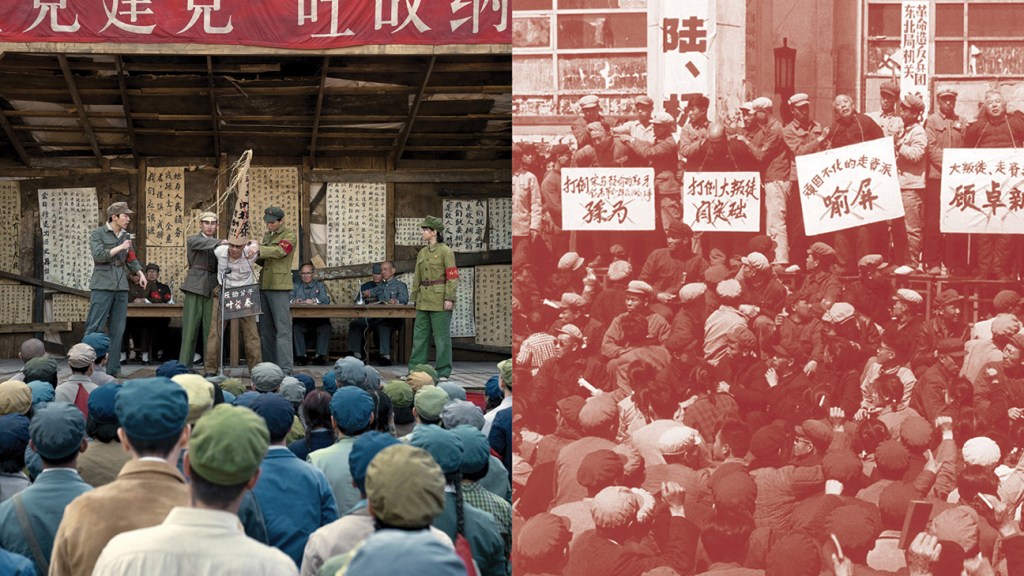“My Family’s Traumatic Journey Chronicled in Television Series: A Guest Column”
A few months before 3 Body Problem launched on Netflix, I did something I’d never done before. I showed the opening sequence to my mother.
The scene depicts a “struggle session,” a public rally where a physics professor is murdered by a group of young students after refusing to renounce his teachings. These events were a common sight during the Chinese Cultural Revolution of the 1960s and 1970s, a chaotic and violent period meant to purge Western, capitalistic, counterrevolutionary influences that had seeped into the culture. Scholars generally estimate the death total in the millions.
My mom watched in silence. As the frenzied crowd chanted and four teenage girls shattered the professor’s skull with their belts, a visible chill came over her. Finally she said in Cantonese: “That’s real. That really happened.” Then, after a pause: “Why would you want to show something like that?” Given my mother’s fondness for ultra-depressing Asian soap operas, I was surprised. But the difference, of course, is that the suffering on those shows is artifice. The Cultural Revolution was entirely real.
A much-desired white whale in television is the Thing No One Has Ever Seen Before. These are the scenes that start conversation and spawn memes. On 3 Body Problem, we endeavored to put one or two Things No One Has Ever Seen Before on the screen. We did a Thing with an oil tanker and another Thing with a proton that are both hopefully memorable. But amid all the sci-fi whiz-bang, the scene that means most to me is one that’s been seen multiple times over, decades ago, by millions. Yet it’s rarely been seen onscreen since. The Cultural Revolution has somehow become hazy in the memory of the country where it happened and barely a footnote to most people outside of it. Those lives not lost were altered in ways great and (if you were lucky) small. My grandfather’s colleague was subjected to a similar fate as the unfortunate Professor Ye from our show. My own family fled. There’s every likelihood I wouldn’t be writing this if we hadn’t. How do you responsibly distill it all into a five-minute opening for a TV show?
This is where the team-sport element of filmmaking comes into play. Director Derek Tsang made it a personal mission to get it right. His vision, in collaboration with our art, costume, casting and VFX departments, re-created a Chinese university in the backlot of our U.K. studio. In addition, Derek employed a “chant leader,” who phonetically conveyed each political slogan to our background actors. By the time our sound team worked their magic, the efforts of 300 performers chanting in (sometimes shaky) Mandarin was metastasized into a pitch-perfect, full-throated throng of 100,000.
To this, our casting directors populated our speaking roles with a group of exceptionally courageous Chinese actors who dove into research and interviews to breathe unflinching, three-dimensional life into the scene’s characters. But first among these was Zine Tseng, who played Ye Wenjie, daughter of the tortured professor. As her recent award accolades attest, Zine was a force of nature from first take to last, the conduit through which the viewer experiences the dread, horror, anguish and grief of witnessing her father murdered for the unpardonable sin of speaking his truth.
And what part did we play as writers? A complementary one, if we’re being honest. The incident itself is portrayed in meticulous detail in Cixin Liu’s novel of the same name. Our challenge was to curate the scene from the book to fit the time limitations of the episode and the objective viewpoint of the camera. From a writing standpoint, it isn’t as daunting as crafting a scene from scratch. But it isn’t nothing, either (apart from a double negative). Did we do our job? If the backlash from some of the netizenry in China is any indication, we got something right. (A common objection: An American media company was out to make China look bad.) And my mother said she found herself transported back 60 years.
But she’s my mother. What else was she going to say? Her cousin, my uncle, may be a better case study. He watched 3 Body Problem unaware I was involved in it. He was a teenager during the Cultural Revolution and bore witness to struggle sessions. He said he felt proud that this dark period, which has faded away for so many, was brought to life again for everyone to see. And was it accurate? Were the struggle sessions he experienced similar to what we depicted onscreen?
He paused for a moment and gave a bittersweet smile: “They were worse.”
This story first appeared in the June 19 issue of The Hollywood Reporter magazine. Click here to subscribe.

